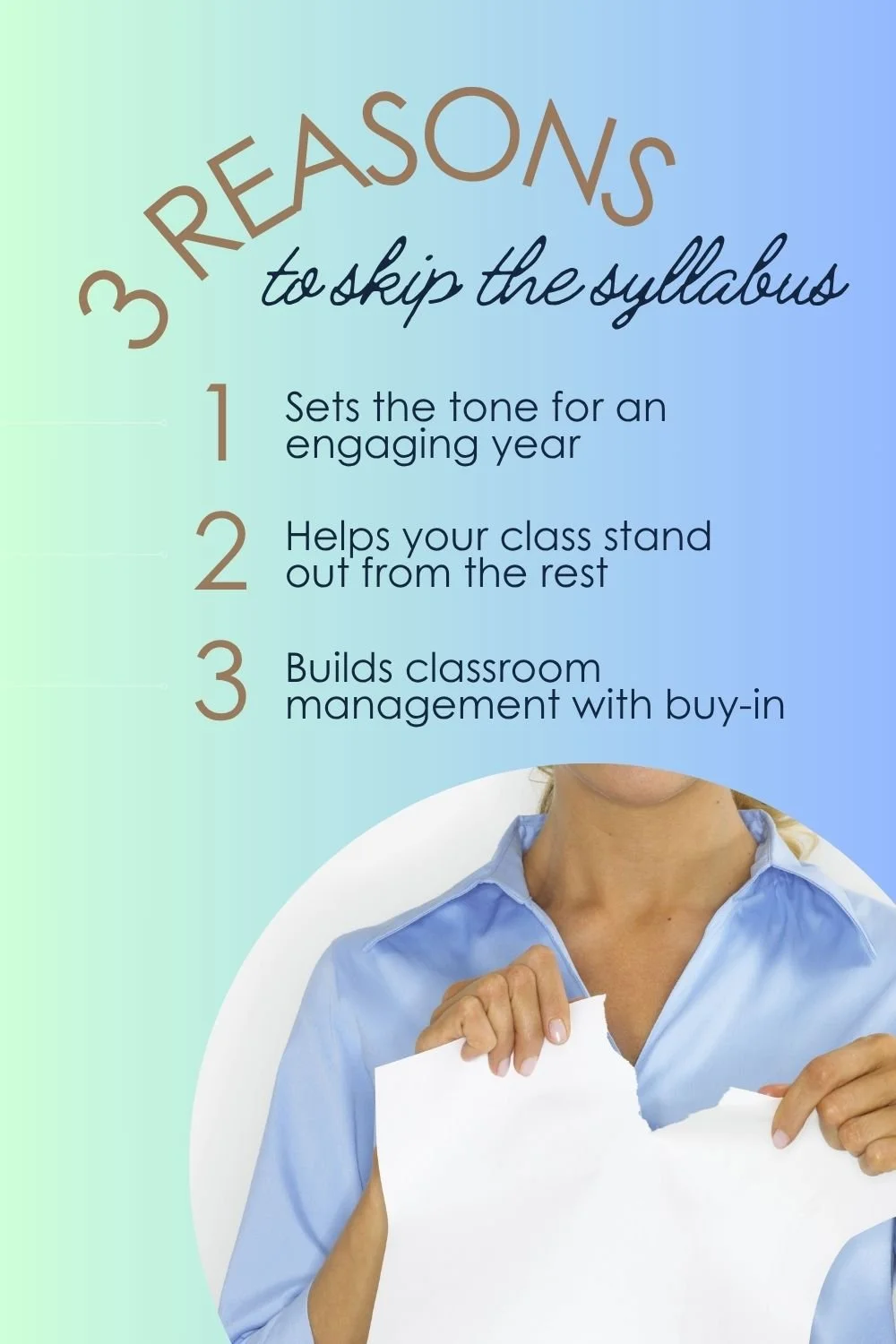Ditch the Syllabus: What to Do on the First Day Instead
In Alaska, the summer solstice means more than 19 hours of daylight, and it’s one of my favorite days of the year. There’s a distinct buzz in the air as everyone celebrates in their own way—midnight fun runs, overnight mountain hikes, barbecues, picnics, even late-night softball tournaments.
But there’s also a quiet shift that happens after. From here on out, each day gets a little bit shorter, until December, when daylight lasts just over five hours. That gentle descent always reminds me how quickly summer slips into back-to-school season. Suddenly, the aisles fill with binders, backpacks, and bouquets of sharpened pencils (any You’ve Got Mail fans out there?).
And with that shift comes a question: How do you want to start the school year?
This year, I want to encourage you to try something a little different. Something that sets the tone for the year.
Why the First Day of School Deserves Something Better
The night before my very first day of teaching, I don’t think I slept at all.
I had serious impostor syndrome. I was a young high school teacher, only a few years older than my students. Half of them were taller than me. I didn’t know what I was getting myself into, but I did believe in one thing:
Confidence is everything.
So I walked in like I knew exactly what I was doing. I greeted students at the door with a handshake and a smile. And then I said something unexpected:
“We’re doing an experiment today.”
No syllabus. No rules rundown. No lecture. Just a hands-on chemistry demo called an iodine clock reaction, where nothing seems to happen… until suddenly, everything changes. One moment the liquid is clear, the next it turns a dramatic deep purple, almost black.
I didn’t tell students what to expect. I just set up equipment at their tables and provided detailed instructions to follow. That was the fun of it. The surprise, the spark.
As students left that day, there was this happy hum in the air. The kind of chatter that tells you they’re excited. That they’re curious. That they might even look forward to your class tomorrow.
And the best part? That energy carried through the whole year.
It was my very first year in the classroom, but against all odds, behavior was never a major issue. We started with momentum, and that made all the difference.
Now, whether I’m teaching chemistry or life skills, I aim to create that same sense of curiosity and buy-in from Day One.
Day one doesn’t have to be about classroom rules.
Why You Should Skip the Syllabus (for Now)
If you’re on the fence about doing something different on day one, here are three reasons to give it a try:
1. It Sets the Tone for an Engaging Year
A hands-on activity on the first day sends a clear message:
“This class will be different. You’ll be doing things here. You’ll be learning things that matter.”
Students remember how class feels before they remember the rules. So if your first impression is energetic, interesting, and student-centered, that impression sticks.
2. It Helps You Stand Out from the Crowd
By the time students get to your room, they’ve likely sat through four or five other first-day speeches. They’re stiff. Tired. Probably already zoning out.
Doing something active, something with no right or wrong answer, or something unexpected, immediately sets your class apart. Especially for students who don’t usually feel successful in school.
In my experience, students with learning differences often shine during these activities. They might be the first to finish. Or they approach the task in a creative way that no one else considered. When that happens, you can see the pride on their faces.
That moment of success? That’s how you start changing a student’s relationship with school.
3. It’s an Investment in Classroom Management
Engaged students are less likely to act out.
If you start the first day with a high-interest, structured activity, you eliminate downtime, channel nervous energy, and begin building trust, all without having to lecture about rules.
Of course, you still want to go over class expectations. I do too! But I’ve found it’s more effective to wait a few days until rosters settle and students are ready to listen.
Just a few reasons to consider skipping the syllabus on the first day of school.
What to Do Instead: Real Ideas for Real Classrooms
You don’t need to plan a Broadway production. Just choose an activity that gets students thinking, talking, and doing. Here are some simple, low-prep ideas by subject area:
Science
Elephant toothpaste or iodine clock reaction demo
Safety lab scavenger hunt
Toothpick bridges or marshmallow tower challenge
Math
Logic puzzles or number riddles
Graphing student-generated data (e.g., hours of sleep or TikTok time)
Math escape room: Solve review problems to unlock clues
Language Arts
Create memes using figurative language
Write six-word memoirs on index cards
Build-your-own Mad Libs
Social Studies
“What Would You Do?” historical dilemma cards
Map scavenger hunt or “Where in the World?” game
Fact vs. opinion bingo using news headlines
Art, Music, Drama
Collaborative mural with sidewalk chalk
Quickfire improv games
Self-portrait challenge with silly constraints
CTE, Health, or FCS
Design-your-own survival kit
Budget-a-meal using grocery flyers
Health trivia speed rounds
Teaching AVID, Study Skills, or Support Classes? Start with Life Skills.
These courses are the perfect place to dive into real-world skills. Honestly, that applies across the board. Every student benefits from learning how to budget, find housing, or plan transportation.
For students who’ve struggled academically, life skills can be the bridge. When we do hands-on activities from my How to Adult mini-lessons, like tying knots or learning how to iron, I watch students who rarely get excited about school suddenly light up. They get it. They succeed. And that confidence carries into everything else they do.
Not sure where to start? I’ve put together three easy, high-interest life skills activities that are perfect for day one, from budgeting with candy to housing searches and DMV practice quizzes:
👉 Start with Life Skills: 3 Real-World Activities for the First Day of School
Free First Day Tool: Life Skills Inventory
Want something simple but powerful?
Try my free Adulting 101 Knowledge & Skills Inventory. It’s available as a printable PDF or a Google Form (great for class-wide data collection).
This inventory helps you:
Learn what students already know
Discover what they’re curious about
Spark honest conversations about adulting and independence
It’s low-prep, flexible, and works in almost any setting: AVID, study skills, SPED, or even general ed electives.
🎁 The free download includes:
Printable version
Editable version
Google Forms version
Student reflection worksheet
Implementation ideas
Final Thoughts: Start the Way You Want to Continue
You don’t have to do something flashy or elaborate. But you do want to start with purpose.
Because the truth is:
What you do on the first day sets the tone for everything that follows.
So, whether it’s a color-changing science experiment or a conversation about paying rent, make it count. Choose something that engages students and tells them, from day one:
“You belong here. You’re going to learn things that matter. And we’re going to do it together.”
Wishing you a meaningful, energizing, and joyful start to the school year.
👉 Need more real-world ideas? Check out: Start with Life Skills – 3 Activities for the First Day
5 ways to have a great first day of school!



